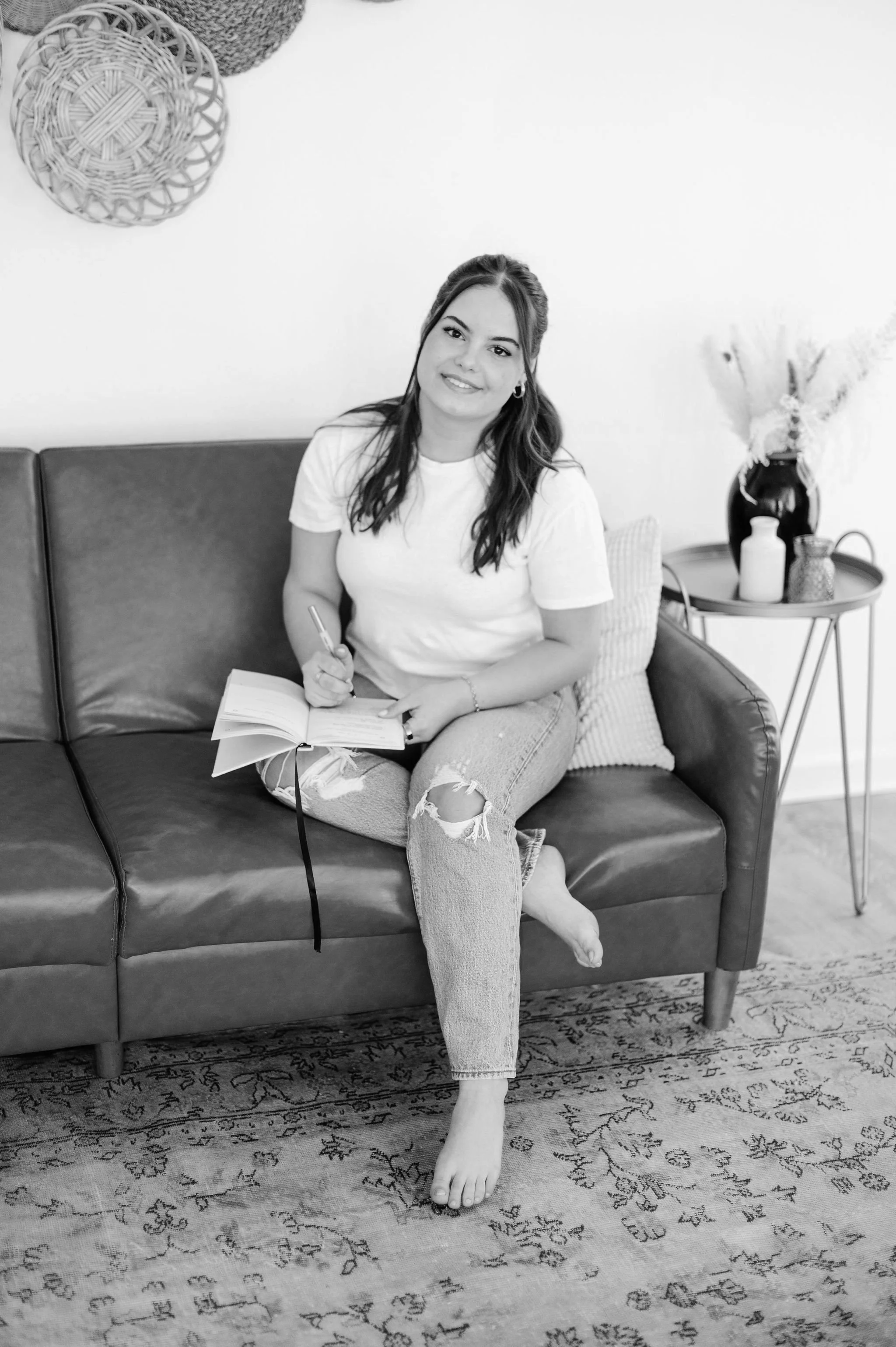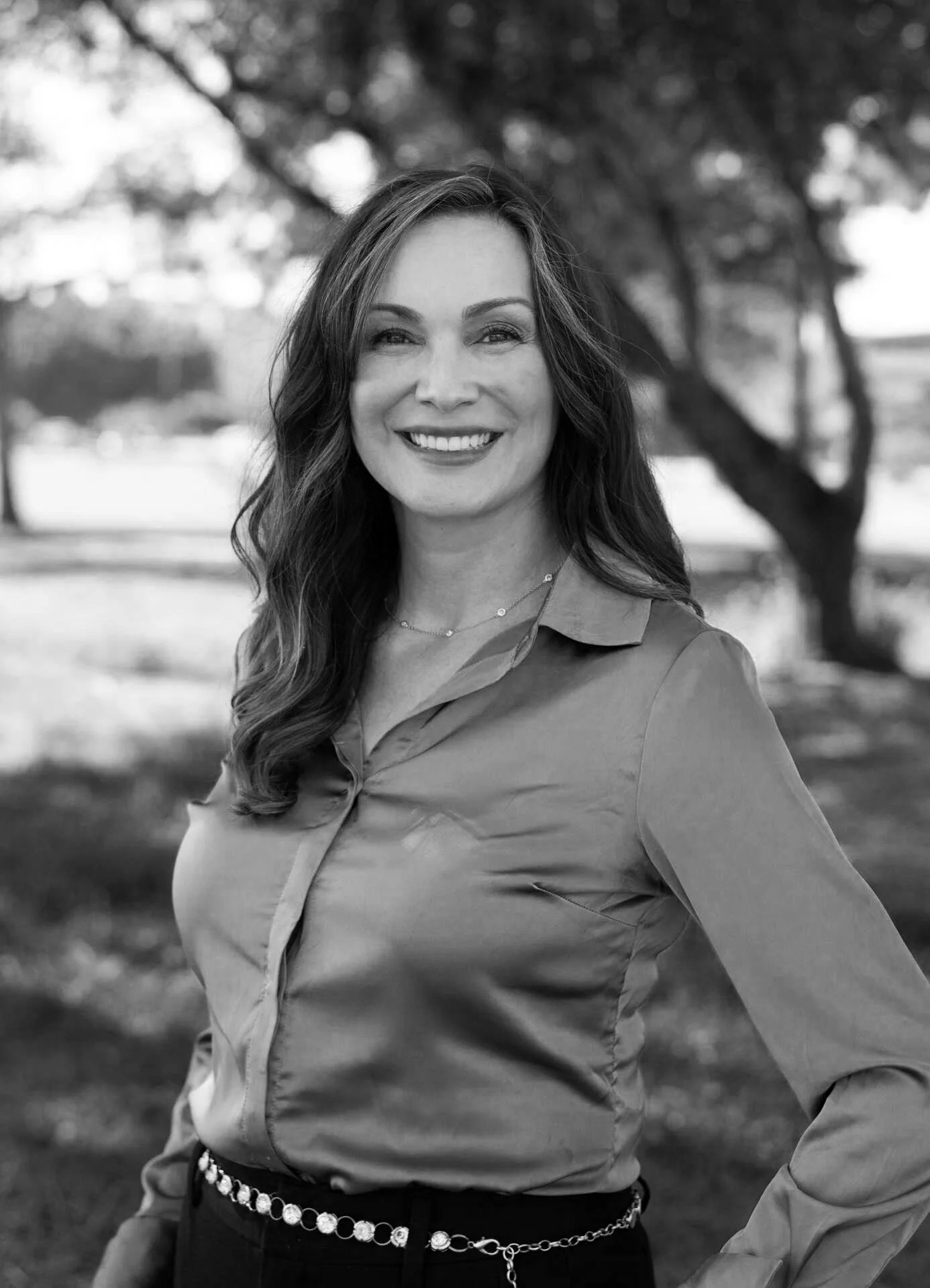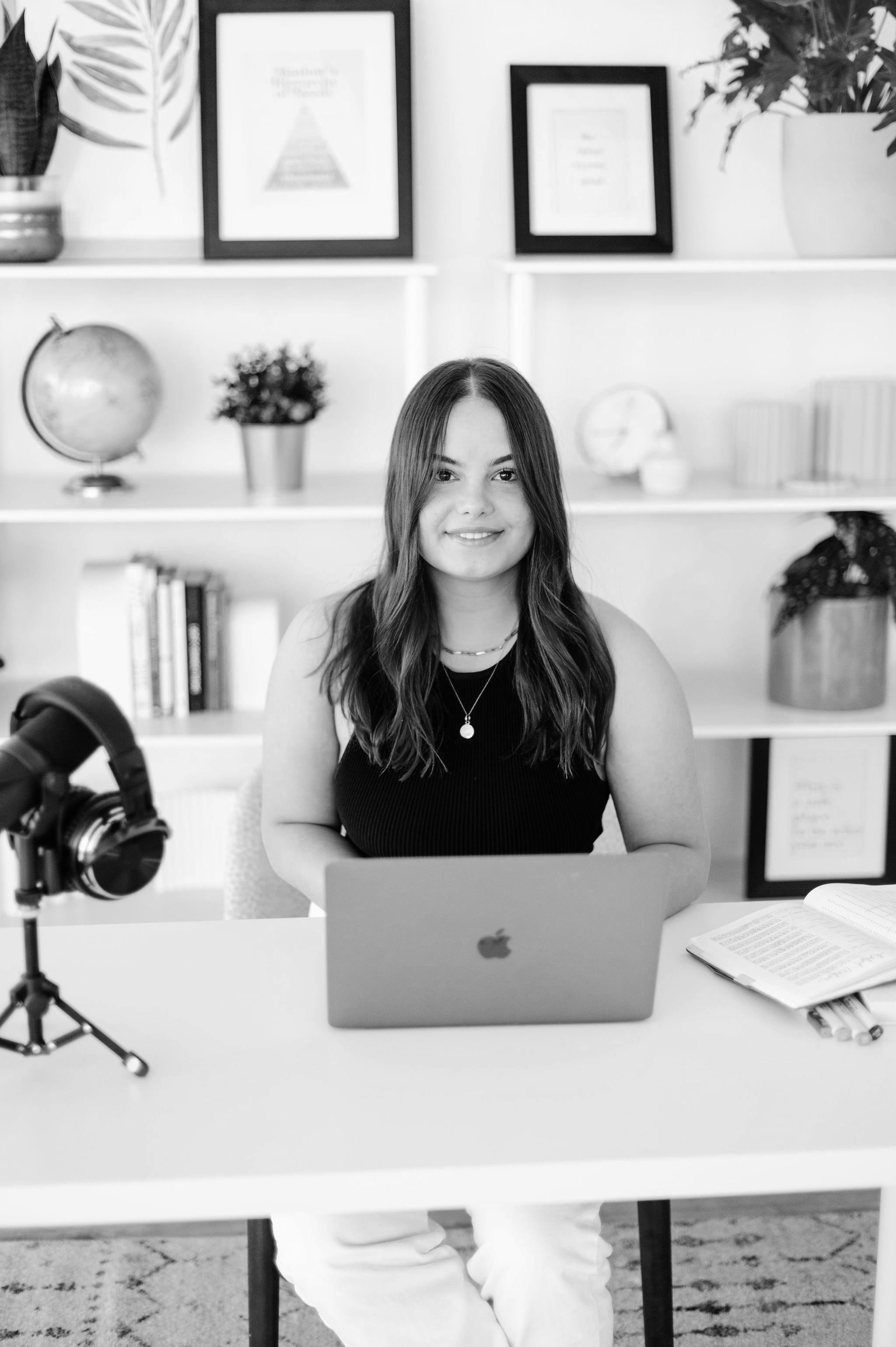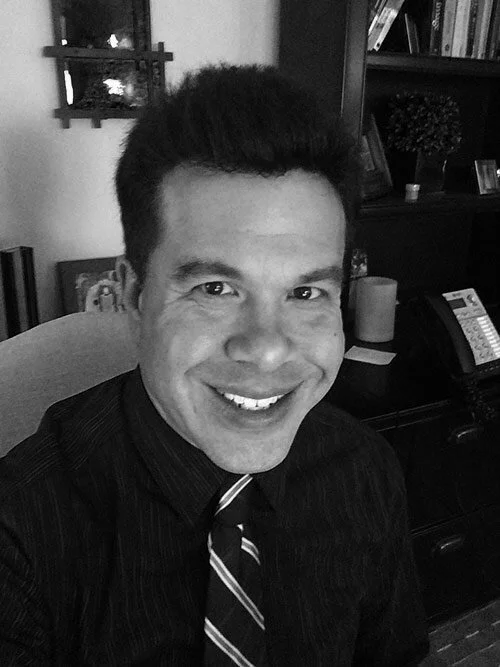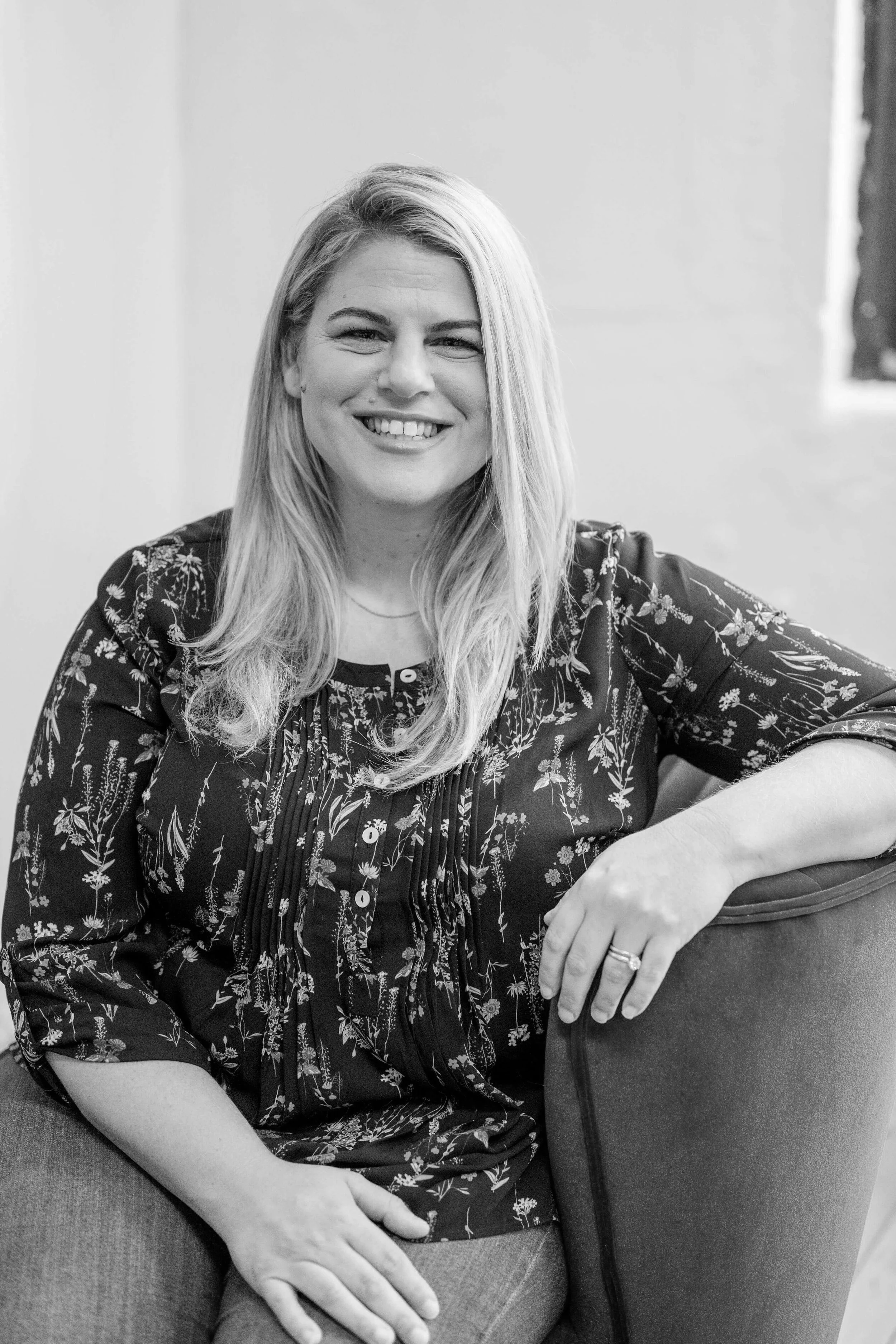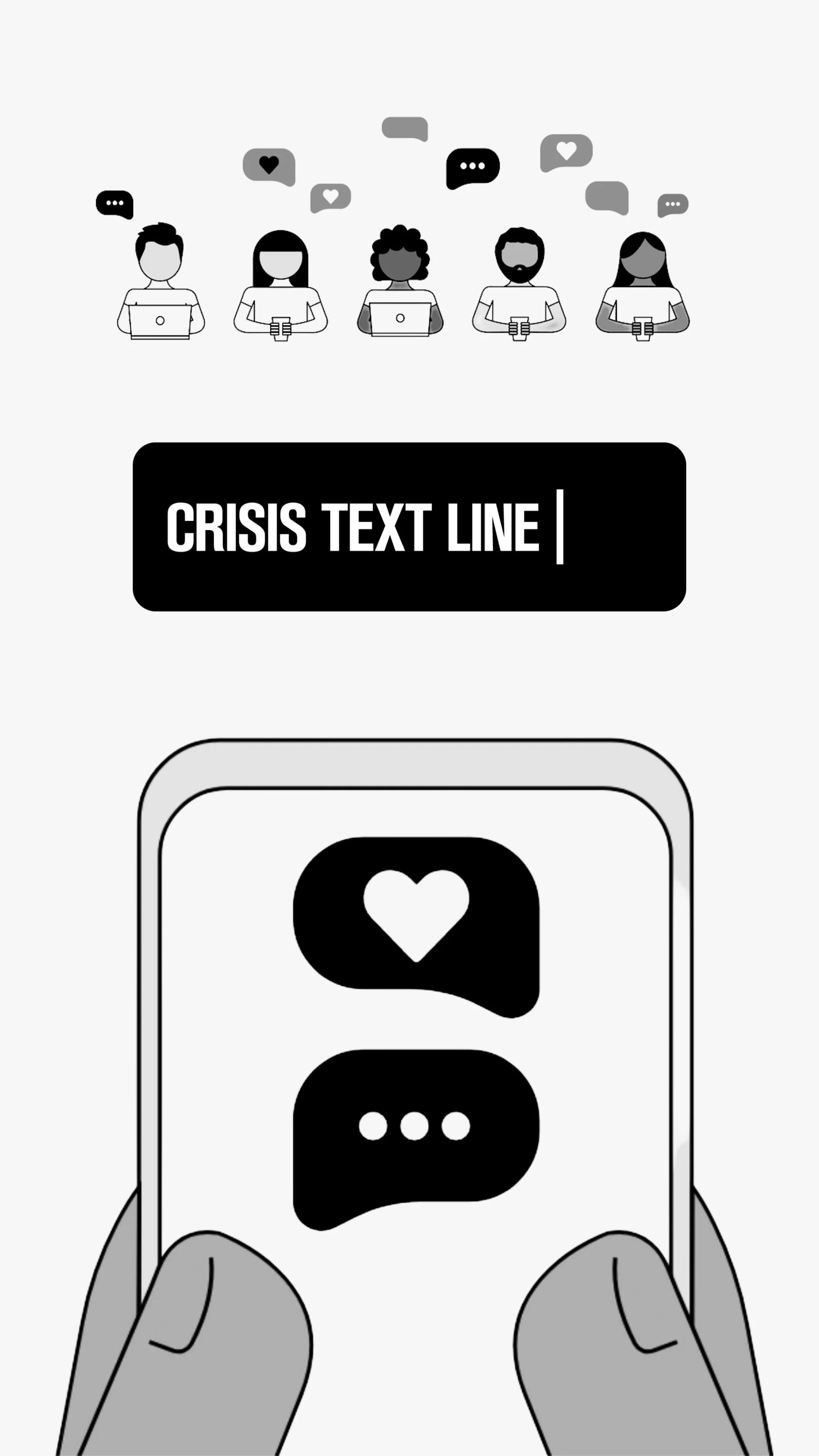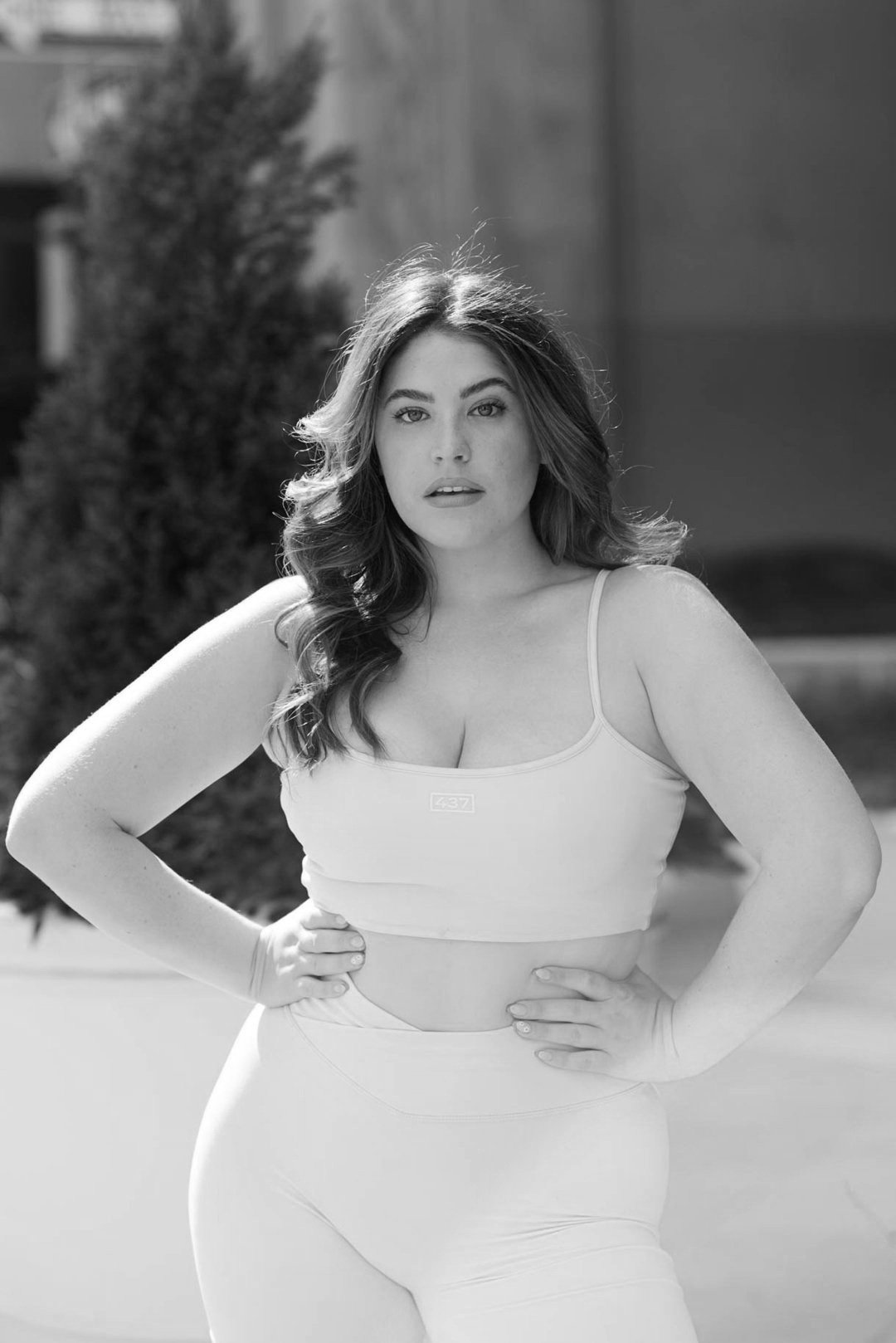105. Mental Health Advice for College Students: Tips to Master Your Routine, Relationships, Rest, Recreation, and Resources
listen to this episode:
Tune in and subscribe on your favorite platform: Apple Podcasts | Spotify | Stitcher | Google Play | Radio Public | PocketCasts | Overcast | Breaker | Anchor
In today's solo episode I am giving you my tips on how to maintain your mental health as a college student! After wrapping up my freshman year at the University of Pennsylvania, I've put together this comprehensive episode to help you feel prepared to navigate college life! I've broken it down into 5 categories: routine, relationships, rest, recreation, and resources! I tell you everything I wish I knew before starting my freshman year and cover topics like choosing classes, taking mental health days, avoiding burnout, roommates, making friends, naps, hobbies, free time, exercise, and more! At the end of the episode, I answer YOUR questions about college + mental health!
Mentioned In The Episode…
+ Asana
+ Notion
+ Ep. 39 Your Foolproof Guide to a Good Night's Sleep (+ 2 Guided Sleep Meditation Practices)
+ Atomic Habits by James Clear
SHOP GUEST RECOMMENDATIONS: https://amzn.to/3A69GOC
Episode Sponsors
🛋This week's episode is sponsored by Teen Counseling. Teen Counseling is an online therapy program with over 14,000 licensed therapists in their network offering support with depression, anxiety, relationships, trauma, and more via text, talk, and video counseling. Head to teencounseling.com/shepersisted to find a therapist today!
About She Persisted (formerly Nevertheless, She Persisted)
After a year and a half of intensive treatment for severe depression and anxiety, 18-year-old Sadie recounts her journey by interviewing family members, professionals, and fellow teens to offer self-improvement tips, DBT education, and personal experiences. She Persisted is the reminder that someone else has been there too and your inspiration to live your life worth living.
a note: this is an automated transcription so please ignore any accidental misspellings!
[00:00:00] Sadie: Welcome to she persisted. I'm your host. Sadie sat in a 19 year old from the bay area, studying psychology at the university of pencils. She processed. It is the teen mental health podcast made for teenagers by a team. In each episode, I'll bring you authentic, accessible, and relatable conversations about every aspect of mental wellness you can expect.
[00:00:20] Evidence-based Tina proved resources, coping skills, including lots of DBT insights and education. Each piece of content you consume, she persisted offers you a safe space to feel validated and understood in your struggle while encouraging you to take ownership of your journey and build your life worth living.
[00:00:37] So let's dive in.
[00:00:41] Hello. Hello, and welcome back to sheep persisted. I'm so excited that you're here today. I asked you guys what solo episodes you wanted in the next couple of months, and this was the most requested. So I'm super excited to bring this resource to you today. We're gonna talk all about how to maintain your mental health as a college student. So I've broken it down to some categories. I think I have it pretty. Summed up effectively. So we're gonna go over routine relationships, rest recreation, and resources. And I feel that if you stay on top of these different areas, you are putting yourself in great shape to be able to stay on top of your mental health.
[00:01:15] These are all things that are tried and true that I've tested out this year. Things that have worked for me, I'll talk about things that didn't work as well. And also mix in bits and pieces that I learned from dialectical behavioral, therapy, going to treatment all of those things that I still use.
[00:01:30] We are also going to answer some of your questions at the end about navigating mental health while in college. So stay tuned to the end to answer your guys' questions.
[00:01:39] So the first thing that we're gonna touch on is routine routine is huge because in college you have a lot less structure in your day. In high school, you're getting up at like seven you're in school until four. You probably have extracurriculars than you have dinner. You really don't have a lot of freedom over your day, unless it's on the weekends.
[00:01:56] And college is really a complete 180 from that you have a couple of classes sprinkled throughout the week, but there are odd breaks. You're not scheduled from 7:00 AM to 9:00 PM. Like you are in high school. And so it's on you to come up with a routine that supports your physical health, your mental health, your academics and any other goals that you're trying to.
[00:02:15] So the first thing that comes to mind when I think about routine in college is your class schedule. And there were a couple things I wanted to mention here that I was never told before going into college that I thought would be helpful to mention, because again, So different from, from high school, these things wouldn't even cross your mind.
[00:02:30] But it's super helpful to know going into college. So when you're choosing your classes I have a couple of pieces of its of advice. The first one is to talk to people that are a year or two above you and are trying to go into a similar major or field.
[00:02:43] So if you are a stem major and you're doing pre-med, there's gonna be like a really set track of what classes you're gonna take. What electives you're gonna take if you need those. Exactly what level of math and chemistry and bio. So talking to an upperclassman or someone who's done that before can really help you understand what other people in your class are gonna be taking.
[00:03:02] So. Easier to make friends with people that are in your year in similar classes going through the same thing. And then you don't end up in like some random elective that yes, you do need to take, but most people take senior year. So ask people that are on your similar major, what they did for class schedules, what they wish they did differently.
[00:03:20] A really good example of this is at Penn. We have to take a writing seminar and it's a lot of like basic writing skills. And we it's. Different topic, but almost everyone takes it as a freshman. So yes, you need it by the end of your four years, but most of the people in the class are freshman. And if you wait, you're stuck in a class with a bunch of freshmen and you don't have friends in the class, it's not as enjoyable.
[00:03:41] So it's really important to kind of be aware of those things. So ask around, see what would be effective. Another thing here is to see what people thought of classes. I don't know about every single school, but at Penn, there is this website called Penn course review and people rate the professor, the difficulty of the class, how much work you're going to do.
[00:03:58] And really just all around if it's a good class or not, which professors they liked best on, which classes were not easier to succeed in, but you felt more set up for success. So either ask other students that have taken the classes before, I'm sure there's like some random Reddit thread out there about these classes, but that's another really helpful thing that going into college, I was like, whatever, like it's all a college class. Like it's all the same subject. Like if I can stay on top of the work, it'll be okay. But having a good professor and having a syllabus that is really well put together, in course, materials that are really well thought out really is like night and day and setting you up for success.
[00:04:34] And it's a much more enjoyable experience. If you have a great professor in a well organized class. The second point I wanna make here is about spacing out classes. This is another thing that's totally weird going into college is that you're picking your courses. So for Penn, they have you do four classes the first semester, and then they have you do five the second semester.
[00:04:55] So that's less than you're doing in high school and the way it's structured, some of them meet like once a week or twice a week, and it's not every single day. I have found that myself and a lot of my peers have been able to make is that you're not necessarily taking classes on Friday. I love that if you could optimize for that.
[00:05:10] Great. And then the other tip I would add here, which I found was like night and day for being able to stay on top of work and. Not become overwhelmed as like capping out like two or three classes a day. So not taking like four back to back classes on one day, and then having literally no classes the next day I found that really difficult to again, stay on top of work, make sure that all my homework was done.
[00:05:33] Feel like I am. Keeping up a good momentum and not getting burnt out. So my recommendation would be like two to three classes per day. Look at your schedule. Think about that. It's really easy to be like, oh, I got that. Like, they wouldn't offer the classes if it wasn't possible to stay on top of them.
[00:05:47] Like, it's fine that there's seven back to back classes all on Monday. But gave yourself some grace, like you've never done this before. These are different classes and you've taken it in high school. So be intentional. Make things a little bit easier on yourself, if you can, and then you can ramp things up second semester, if you need to.
[00:06:03] And then the last thing I wanna add here is just like physical health, sick days. If you're not feeling well, mental health days are okay to take. And this is something that I know you've probably seen tons of legislation about in high schools and in elementary schools, but it's an important thing to remember in college as well.
[00:06:19] Especially when you're really overwhelmed and stressed out and struggling being able to take a day to recharge and really. Be more effective in your classes and in your schedule going forward can be something that has been really effective and powerful for me to utilize this year. And mom and dad for listening.
[00:06:37] Yes, I do go to my classes. I'm just saying, just like you take a physical, sick day. Mental health days are okay too. And then the last thing I'll add here about classes is to schedule work and studying time into your day. Again, similar to high school, like the work. Homework time is scheduled into your day probably at night, because there's no other point in the day when you could do it.
[00:06:58] Versus at college, it's like you have three to four hour blocks in the middle of the day. Maybe there's days when you only have classes in the morning. So you have so much more time to. Figure out what you're gonna do with your day. So schedule and study blocks that you don't miss make that commitment to yourself.
[00:07:14] And it doesn't mean that there's always gonna be a ton of stuff for you to do, but you can start getting ahead on readings. If you get behind on work, those are great opportunities to make up that work. But schedule that in for yourself because it's not magically gonna happen. And I found that having less structure in my schedule means that it's kind of more difficult to get things done and hold myself accountable.
[00:07:32] So schedule those things in pack your schedule. So it's like, okay. Gotta work on this homework now, or it's not gonna get done. And that sense of urgency can be helpful. The last thing that I will no similar to class scheduling, I wanted to add a couple of tips that I've found to be really helpful for organization and staying on top of things for organization, my favorite.
[00:07:52] Online, like digital planners have been a sauna in notion they have different interfaces, and it's kind of just like, what works best for you. But I will go in at the beginning of the semester and enter all of my assignments that I have due so I can see them laid out on the calendar. And that's been crucial for me to be able to stay on top of work.
[00:08:09] That's another thing that's totally different from high school is that a lot of your teachers will make. The homework and the deadlines available at the beginning of the semester. So you're able to really plan out your time and see what the workload is like. And it's not like a random surprise. Oh, you actually have like 37 pages of reading that wasn't on the syllabus.
[00:08:26] There's a lot less uncertainty there. I also love a physical planner. I think that's super helpful for me to stay on top of things. In addition to working on using Asana and notion Asana. I did second semester notion. I did first semester. I really like Asana. And I'll post like a pros and cons of both of these on Instagram.
[00:08:42] If you guys are interested. But it's again, really what works for you and what interface you prefer. But I love a physical planner and then to stay on top of my schedule, I love apple calendar, but I have it integrated with my Google calendar and I don't. Anyone here at college that doesn't have an apple or a Google calendar, or at least a physical calendar saying like when their classes are and when they have to be at, I don't know, club meetings, because again, your schedule is a lot less structured than it is in high school.
[00:09:12] And so you have to write these things down somewhere. You're never gonna remember.
[00:09:16] I also wanna add related to class schedules before the first day of your classes. Like first and second semester, I highly recommend walking to the buildings and figuring out exactly where your classroom is. If you are like graded directions, love that for you.
[00:09:30] I am not. And college campuses. Crazy confusing. So that was really helpful for me to know exactly where I was going for my class. And it wasn't like I was running late and gonna be the last person to get there and overwhelmed because I don't know what's happening. So that was a tip, my friend and I walked around and that decreased so much stress the first day of school.
[00:09:50] And then the last thing I'll add kind of related to technology. Was just weird coming into college is that everyone does their math on an iPad. No one used iPads at my high school to do math. You used a pencil and paper.
[00:10:03] And then I took a math class here this semester and no one used pencil and paper. And I was like, this is really strange. So I just wanted to give you that little bit of information in case you're taking tons of stem classes and you're like, do I prepare to do things like by hand or is it gonna be more digital?
[00:10:21] That has been my experience. If you were curious the last things that I'll mention for routine is morning and night routine. I think these are two opportunities to really set yourself up for success and either recharge for the day or. Boost your mood before you go into any of your classes or interactions with other people.
[00:10:38] I really love my night routine and my morning time I feel like I've done a pretty good job about making it a time of day that improves my mental health. So whether it's like reading a book, I really like before bed or watching a TV show or doing my skincare routine, drinking coffee in the morning, your day again is gonna be really crazy.
[00:10:56] Things are stressful in college and really taking those two times of the day to check in with yourself and give yourself a moment to like, breathe, relax. It's gonna be okay. Has been a game changer and I highly recommend.
[00:11:10] And we're gonna touch more on sleep routines in the rest part of the episode. But that does go hand in hand with the night routine.
[00:11:17] The last thing that I'm gonna add for routine is meals. So this is like dining hall. You were managing a budget probably for the first time with like dining dollars versus meal swipes. Snacks are totally different than being at home in my experience. And then you also are like living in your dorm room and you have tons of more snacks and access to those kinds of things.
[00:11:37] A tip that I wish I would've known last semester is to have like two or three. Things that I love for each meal that I can pull from really easily. So for lunch, we have this place that's in my dorm . It's called McClelland and they have these TEI chicken bowls. Favorite thing? I know that I can grab that really quickly and get lunch.
[00:11:56] Even if I'm running between classes, same things. They have like meal swipes. So you can get a sandwich it's grab and go. Because again, your schedule's gonna be crazy. And sometimes you're like, I don't even know when I'm gonna eat lunch or do I have time to get dinner before I had did this club meeting.
[00:12:08] So having a really set list of places where you can get dinner, lunch, breakfast, et cetera, is really helpful because it can be so overwhelming. Like at Penn, I think there's like. Six or seven dining halls and there's retail and you have food in your dorm and you could DoorDash something like there are just so many options that it gets really complicated and overwhelming.
[00:12:29] So figure out what you like and make sure that you remind yourself of those easy options when your schedule gets busy. Like, especially during finals. And then the other thing that I found to be really helpful for me, which I wouldn't have expect expected going into this year is that I really like to do breakfast in my dorm.
[00:12:46] So I do like coffee. My favorite breakfast is doing like Greek yogurt with fruit or I'll do cereal. and that's great because I'm not a morning person. I'm not gonna get up like two hours before my first class to go and sit at the dining hall and have a sit down breakfast and then go to my class. And I'm like eating, like right before I go.
[00:13:03] And if I don't eat, I'm starving and then I'm hangry and I can't pay attention. So having little things in your dorm that are nutritious and are fueling you for the day and you don't make breakfast a second priority because you're like I have to get to class. I don't have time. That has been a game changer for me to have those ingredients in the dorm room.
[00:13:20] And it's been something that is simple and decreased stress.
[00:13:23] I know I already said that was the last thing, but I have one more thing to add here, which is resetting at some point during the week. College again, you're living by yourself. So you're probably managing, cleaning by yourself. You're doing laundry. You might be like getting groceries.
[00:13:36] Probably not a ton of groceries, but like you're stocking up on snacks. And so I found it to be really great for my mental health to like clean once a week, whether that's like tidying and all like wiped down, like. The surfaces, I'll do my laundry and I'll kind of reset for the next week. And it makes me feel a lot less overwhelmed.
[00:13:53] I feel more on top of things. I feel more in control and less like, oh my God. Things are just so overwhelming. Like there's nothing that feels like in order or in place. So I don't necessarily do a set day of the week, but I like to be like, okay, This weekend, I'm going to make sure my laundry gets done.
[00:14:08] And I tidy at my dorm room and I have my breakfast and snacks going into the week. And that's a really adulting moment, but it's found, I found it to be very effective. The next pillar that we're gonna dive into here is relationships. So we're gonna talk about roommates, making new friends. And the last thing is gonna be utilizing relationships that you already have for support, which I think is something that's really important that we kind of forget about.
[00:14:33] So the first thing is roommates. Most of the time they're, you can either go random or you can choose a roommate. What I did going into freshman year was I chose a roommate. If you are applying to college this next year, or you just applied to college, there's probably going to be some students that will start an Instagram page or it's was called like up Penn.
[00:14:53] Class of 20, 25. And then there was like a UPEN roomies account. And so people will introduce themselves and talk about like what their interests are and maybe like what their routine is like and what they're looking for in a roommate. And then what I did was I DMed a bunch of people and I was like, Hey, like, I'm trying to get to know people before we get on campus.
[00:15:12] I would love to do a FaceTime call and. I didn't say like, I'm looking for a roommate because I was like, that seems like a little, not aggressive, but I was like, let's just be like trying to get to know people before we get on campus would love to talk. Basically, and it would Def was definitely outside of my comfort zone, but I definitely was grateful that I did that because I at least had like a couple of familiar faces.
[00:15:33] I at least could be like, oh my gosh, wait, like I've talked to you before. Or there are people to ask about like what they're doing the first weekend or how their classes are going, or do they know where this certain building is that you're supposed to have a class? I So, yeah, I recommend reaching out to people, asking to FaceTime. You will figure out like who you connect with and who you're like. I don't think I wanna live with that person. If that is the route you're trying to go, maybe you have mutual friends with someone at home that you want a room with.
[00:15:57] I have had multiple friends that went random and that worked really well for them. . I wanna add here that living with someone can be really stressful. It's someone that you, most times haven't known for your entire life, you probably have different beliefs and routines and preferences of like how clean you like the room, or like what time you go to bed.
[00:16:16] And so it can be really stressful. And if you are coming from living like in your own room or having more of your own space to be living with someone can be overwhelming and it can be more difficult to recharge and feel like you get time to yourself to be able to reenergize and relax?
[00:16:31] I think no matter how things end up, like you can always worst case scenario switch. There's always next year. I think it's great to put yourself out there and try and find someone that you're gonna get along with. Maybe it will be your best friend, maybe it won't that's. Okay. And I also just want to, again, add that caveat that living with someone could be really stressful and that's okay.
[00:16:50] So give yourself more time to be able to recharge, take care of your own mental health. And then that will allow you to show up more effectively in your relationship with your roommate.
[00:16:59] Also relating to roommates, I thought found it very helpful to coordinate like decor and dorm items before we got to campus. So figuring out like who was gonna have a, get a mini fridge who was getting a microwave, like, do we wanna match the colors of our bedding, which maybe like, I literally couldn't care less, but like at least the furniture kind of stuff that was very helpful to figure out.
[00:17:18] Another thing, if you, there are multiple buildings that you can live in. Ask people that went to your college, look up on YouTube. People normally will be like, oh, this is like the fun dorm to live in, or this one's more social. This one's more quiet. So ask around and see what the reputations are because it's difficult to figure out before you get on campus.
[00:17:36] I feel like a good example of this is on the Penn campus. There is this dorm called Che and it's like very far from everything. At least in my opinion, it's like two or three blocks away. And most of the dorms are pretty central and they do have a dining hall with. Within the dorms. You're like, that's nice.
[00:17:54] It's one of like the newer dorms compared to like the quad, which I live in. And so from an outside perspective, you're like, this could be great, but then you're on campus. And you're like, if you're studying in the library until 11:00 PM walking two to three blocks in the dark in Philadelphia at night, probably isn't preferable.
[00:18:11] So ask around, do your research and people are gonna be honest. They're going to be helpful. Especially if you. People that went to high school that went to the college, asked them, and I'm sure they will be super supportive and helpful.
[00:18:23] So friends, this is a really big overwhelming thing for a lot of people, as they transition to college. For the most part, pretty much everyone around you is new. You don't know a lot of people. Again, I found it really helpful to DM with people on Instagram. Add them on Snapchat before you get to college.
[00:18:41] The first couple of weeks, I recommend pushing yourself outside of your comfort zone and. Like saying hi to everyone, introducing yourself, getting people's numbers, being like, Hey, I'm Sadie. Like what, what's your major? Like, what classes are you taking? This is where I'm from. Like, let's get coffee sometimes or sometime.
[00:18:58] And even if you don't necessarily follow through, or you're like, I do not want to. Make my schedule insane with all these commitments, you've at least established a foundation for the relationship. And even if it's like four months from then, and you're like, oh my gosh, we never got coffee. Like, let's go do that.
[00:19:14] You've again, laid that foundation. The introduction has been established. Maybe they'll be in your classes. Maybe you'll be studying for the same test next semester. You never know. So that is one way to make friends. I highly recommend asking for people's numbers on the first day of class, I use this way more than I thought I would to be like, oh, do you know what homework is tonight?
[00:19:31] What do you think is gonna happen on the quiz? Or even just asking people to study? I feel like the first day is when it's. Least anxiety provoking to do that. As you get further into the semester, it's like, I don't wanna ask them. We've been sitting next to each other for five weeks and we've never spoken.
[00:19:45] Why would I ask them for their number now? But asking people, because you never know if there's like a question on the math homework that you're so confused about and you need help on having their number could be really helpful and people are gonna be so willing to offer that.
[00:19:59] Today's episode is brought to you by teen counseling. As I mentioned, therapy was a huge part of helping me feel supported and effective in my transition to college and making sure I was staying on top of habits and reaching the goals that I wanted to, and also being able to check in and vent and get support when I needed to.
[00:20:17] So teen counseling is an online therapy program with over 14,000 licensed therapists in their network. There are better helps program for teenagers. They offer support on things like depression, anxiety, relationships, trauma, and so much more all via talk, text and video counseling from your home.
[00:20:34] So depending on what level of support you're looking for, they're able to meet your needs. So, if you are interested in finding a new therapist or starting therapy for the first time, you can head to teen counseling.com/she persisted. You're going to fill out a survey about what you're hoping to work on in therapy.
[00:20:51] So maybe that is habit setting, maybe that is working through anxiety about starting college next year
[00:20:56] maybe that is staying accountable and on top of assignments, whatever it is, you fill it out in the surveys that they can match with a therapist that specializes in that area. So, if you are under 18, you will then put in your parent or Guardian's email so that they can consent to treatment. It is a super vague email, old. It says if Sadie or whatever your name is, is hoping to work with a therapist from teen counseling, none of your information disclosed in the survey is then told to your parent or guardian HIPAA is enacted.
[00:21:22] Of course. Um, and I try to sent the email to myself, so I know it works. So in case that was a concern, just wanted to explain what that was about. So to start therapy, you can go to teen counseling.com/she persisted again. That is teen counseling.com/she persisted to find a therapist today.
[00:21:39] Another great way to make friends is to join clubs.
[00:21:41] I feel like this is really different at every school for Penn, B clubs are very preprofessional and people joke that like the clubs are harder to get into than the school itself because everyone's competing against each other. Again, very preprofessional it's like consulting clubs are different.
[00:21:55] Business things. I am in service dog club. It's my favorite thing ever. I get to walk dogs and play with puppies. So things like that, figure out what your interests are. You will meet people that have similar interests to you, and that is another way to get social events on the calendar so that you have ways to interact with people and connect.
[00:22:13] And there's always that option there.
[00:22:15] Another thing that is so different from high school is that it's like very normal and okay. And casual to ask people all the time to get like coffee or study or grab dinner, I think in high school like that you were probably more established as friends. If you were going to dinner or to grab coffee or to spend the afternoon studying you probably like classes together, you hang out at lunch at college.
[00:22:37] I feel like that's a great way to start a relationship. And to just start to get to know people there's been multiple times where I'm like, I think I, this person's nice. Like I had one conversation with them and I'll be like, do you wanna grab coffee? Or do you wanna grab dinner?
[00:22:49] And then we'll either have a great conversation and end up talking for two hours or it's like, okay, didn't really connect with that person. But it's great. Now I know. So that is something that I highly recommend doing. And again, like I mentioned, even if you don't put something on the schedule, setting, the foundation is great because then if you need it later on and you're like, I'm feeling really isolated.
[00:23:07] And I wish I had more people to connect with. Laid that foundation for yourself and you can follow up and get those needs met. The last thing I'll add here is that Snapchat bit emojis are gonna be your best friend. You're gonna meet so many people at the beginning of college, and you're not gonna remember anyone's names.
[00:23:26] You're not gonna remember their major. You're not gonna remember what they look like, but Snapchat gives you nice little graphic. So you're like, oh, I met, I don't know, Sarah in my philosophy class. But I don't remember what she looks like, look on Snapchat and at least it jogs her memory and it's super helpful.
[00:23:42] And the last thing here is using relationships that you've already created for support. I think especially in the first couple of weeks of college, I was just like 100% in the moment I wasn't. Like calling hobo as much or connecting with other people. Because you're just so focused on navigating what's right in front of you, but you've likely made a lot of relationships in your life with people that love and care about you and want to support you.
[00:24:07] And so if you are feeling stressed out, if you're feeling overwhelmed, Scheduled into your day, your routine to call your family or friends and connect with people to boost your mental health. And then you'll be able to show up more effectively in your classes, in your relationships, on campus, and continue to strengthen those as well.
[00:24:26] Rest, this is another key one. The anecdote I have here is that every single time I call my dad, he is like, why aren't you studying Sadie? And I'm like, do you realize how many hours there in a day, how many hours I have other things to do? And it's very important to get rest and to take time away from classes and studying, or you will burn out very quickly because college is a lot of work.
[00:24:48] It's no joke. It's a lot of studying. It's a lot more independent than high school. Like you are the one that is putting in the hours if you want to do well. And the, the structures aren't there as much as they are in high school. So because of that, it's even more important to build rest into your routine.
[00:25:04] So. I find it really helpful to have like time off from school. So whether that's like a cutoff time at night where you're like after 11:00 PM, I'm not gonna work on homework because it's not effective for you to like write a random essay until 4:00 AM and get up and go to class the next morning. Or you're like Fridays.
[00:25:20] I am not gonna think about school work. And then Saturday and Sunday, I'm gonna be in the library. And that works well for you. So make sure to take time off emotionally, mentally. Stress wise, because again, it can lead to burnout really quickly. And that's something I found to be very effective for me.
[00:25:38] Sleep is a huge thing. You just, won't be able to show up as the best version of yourself. If you're not getting enough sleep, you won't be able to perform academically. You won't be able to pay attention. You won't be able to learn. You probably won't be very enjoyable to be around socially. You will fall behind on things.
[00:25:55] So sleep is key. And again, it's something that you are in charge of, and that you have to prioritize yourself. I have a whole episode that goes into depth on sleep hygiene and sleep routines. And what works for you. Highlights are to have a consistent sleep schedule. So get up and go to bed at similar times.
[00:26:13] It's okay. If it looks different than high school, like if you're not a morning person, be like, great, I'm gonna get up by 10 30 and that's your goal? Or you're like, okay, I'm gonna go to bed by two. And that feels like a good goal for me. So it doesn't have to look like, okay, I'm gonna go to bed at 9:00 PM and I'm gonna wake up at 5:00 AM and go to the gym.
[00:26:29] And like, that's not the goal here. We are just looking for some semblance of consistency. We are looking to get enough hours so that you can show up in these other areas of life that are important to you.
[00:26:40] Another thing I wanna add for sleep is naps. Naps are more easy to get in college than they are in high school, because you're not in class all the time. They're a slippery slope. I love a good nap. Can mess up your sleep schedule. There are pros and cons there. You're gonna have to do some trial and error.
[00:26:55] But for me, I, that's something I'm very mindful of. I pay attention to, because again, it can mess up my sleep really easily and get in the way of my schedule and staying on top of work. And the last thing I'll add with rest is to take time to recharge socially. I feel like the first couple of months, weeks of college, you're really quickly gonna understand if you're more extroverted or introverted.
[00:27:19] And by that, I mean, if you feel recharged when you're in a group or when you're by yourself for me, I'm definitely more introverted. I like to spend time by myself to recharge and then I'm able to show up in social situations. Don't necessarily like get more energy from being in social situations for super long periods of time.
[00:27:36] So being able to recharge socially and kind of like have my dorm room, be a safe space and have that morning and night routine to really be by myself and relax and take a breath is really helpful. Meals can be another great option. I'm not advocating to eat by yourself for every single meal. That's not a great idea.
[00:27:53] Again, we are trying to stay connected because that's good for mental health. But if you're like, I like, for me, I like to do my breakfast to my dorm room before I go to class. That works really well for me, rather than like, like I'm gonna meet you at the dining hall at 7:00 AM to my friends. Like that just wouldn't be effective for me, my mental health and my schedule.
[00:28:10] Same thing with like a lunch. If you are super overwhelmed and feeling stressed in the. For classes and you have a break in the middle of the day, go ahead and do like a meal by yourself. Maybe you like listen to a podcast or you work on a reading that you're trying to get done and taking that time to be independent and recharge is huge, especially because your social life will probably look a very different from what it looked like in high school. Just based on the structure of your schedule and people are living by themselves, they're a lot more independent. So building that time to recharge socially into your routines again, you don't get burnt out is huge.
[00:28:45] The next area we're gonna talk about is recreation. I wish there was a better word for this, but it starts with horror. So we're gonna go with it. We're gonna talk about hobbies, free time exercise. And then also related to exercise is walking. So for hobbies, this is a huge thing in college, and I think it's something that people struggle with going from high school.
[00:29:04] To college and high school, you likely have like a lot of clubs you were involved in, or maybe you were an athlete, but you're not an athlete in college or you were in like student government, things like that. And so then once you get to college, yeah, you're still taking classes. Maybe you are an athlete, but those hobbies and extracurriculars are no longer strictly built into your routine.
[00:29:24] I think it's super important to keep incorporating them because they're great for your mental health to build mastery and accumulate. Those positives is something that is great for your emotion regulation, but it's something that you're being more intentional about. So for me, the things that I make time for is exercise.
[00:29:42] I really like to make time to read or watch TV shows that I really like the podcast is like kind of work, but also that's a huge thing. That is a hobby for me.
[00:29:51] I mentioned service dog club playing with the puppies and going on walks with them is another huge thing that brings me a lot of joy. So be intentional about that. Another great way to get those on your schedule and have that level of accountability is clubs and making friends with people that have similar interests as you do.
[00:30:08] So if someone else is really loves listening to podcasts, we're using that example. You are listening to a podcast, maybe that is you. Now I'm gonna give a better example. So if someone else really loves, like one of my friends and I, we are both watching the Kardashians and every single week after the episode comes out, we're like, what did you think?
[00:30:25] Building that accountability with someone else keeps you on top of those hobbies and those moments that bring you joy and improve your mental health. The other thing here to add is free time. You're gonna have so much more free time than you would in high school. Whether that is the weekend, whether it is time in between classes, whether it is nights where you finish school way earlier it's something to be aware of and intentional going into college.
[00:30:50] I think it makes sense to kind of like put some thought and think, okay, what is important to me? In a week, like, is it important to me that I spend time outside is important to me that I get dinner with friends. Do I want to prioritize exercise? How much am I prioritizing studying? And then breaking up your schedule to reflect that Like I mentioned earlier free time can be overwhelming for me when I have more free time.
[00:31:11] It's harder to stay on top of work. So kind of being mindful of that, of when the free time becomes like an endless pit of procrastination versus something that allows you to relax and recharge and show up as a better version of yourself. Exercise. This is another one, especially if you were a student athlete in high school, but you're not in college.
[00:31:31] You gotta, you gotta motivate yourself or it's not gonna happen. This has definitely been a goal for me this year. Especially second semester, I started by being like, I'm gonna go and exercise so I can sleep better. Like, that was the only motivation I was like, if I get this movement in, I will be more tired when I go to sleep and I will sleep better and I don't wanna be tired.
[00:31:50] That was the goal. And now it's more like I enjoy that moment. I will like watch TV or listen to music. And I can check it off my to-do list. That's something that's very reinforcing for me. So set like a really small, a manageable goal. Maybe you're like, I'm gonna go and walk for five minutes.
[00:32:03] Maybe you're like, I'm gonna do one of those like 10 minute app videos on YouTube, whatever it is and stay consistent. That is the goal here is to stay consistent instead of like one time going to the gym for three hours and you're like, wow, that was great. But you never do it again. But yeah, it, it really just set you up for success.
[00:32:19] In a lot of areas of your life, whether it's your physical health, it's your sleep, it's your ability to stay focused and learn in your classes. And it's also a great way to spend time for yourself. And for a lot of people, it's a way to recharge and boost your mental health baseline. The other thing that I want to add here is walking different from this is different from college campus to college campus, but at least at Penn, you walk everywhere.
[00:32:43] And this is super different from, at home where the, like the high school campus, which was much smaller, like, yeah, you had walked to your class, but you were like going downstairs in the building. I find it really helpful to pay attention to my steps. It's kind of a indicator of what I did that day. If I get like more than 7,000 steps, it means that I probably went to the library. I got work done. I ate outside of my dorm room. I probably saw a friend. I spent some time outside, all things that are really good for my mental health.
[00:33:11] Whereas if I get less than that, it's probably like, I got like 500 steps and I was working in my room all day and napping on the weekend. So. That has been a really helpful indicator for me and a goal to set. It's also a really great way to unplug, feel less stressed about academics and social stuff. And you also get to see more of this new place that you're living in. I feel like there's so much to Philadelphia that I haven't explored that I want to continue to and walks are a really great way to do that, the last R that we are going to go through is resources. The last R that we are going to cover is resources. These are gonna be pretty basic resources. These are not like extreme mental health intervention. I need lots of support resources. If you are looking for those. You can send me a DM on Instagram, you can send me an email. The first step that I would definitely recommend taking is talking to your counseling center at your school, talking to your parents, a family friend that you trust, and they can definitely redirect you further but resources to lean on just to maintain your baseline mental health and set you up for success.
[00:34:10] I recommend past relationships. Therapy has been really helpful for me. There is a ton of on-campus mental health support at most schools and then content. So we talked about past relationships, building conversations into your routine, with people that improve your mood and help you feel seen and validated and supported can be really helpful and allow you to show up as a better version of your.
[00:34:30] In your relationships on campus therapy has been something that has been so helpful for me to navigate the transition, stay on top of goals. I'm setting for myself, whether that is like studying for a certain number of hours each week, or trying to get more exercise or staying on top of my sleep.
[00:34:46] That's just been really helpful to have in my routine. And again, a preventative measure to maintain my mental. Most schools will have on campus, mental health support, whether that is like tech support counseling. There's a lot that will be like video or audio calls. Ours is called caps like something psychological services.
[00:35:10] And they're constantly talking about it. There is posters everywhere. So a lot of campuses will have resources available if you need them or you need someone to talk to. And then the last thing that I want to add here is content. I think that having. Content that you're consuming that supports your mental health is really effective.
[00:35:26] So whether that is podcast books, maybe it's a TV show, making sure that the ways that you're spending your free time is improving your mental health rather than deteriorating. It is something that I try to be mindful of. So before we dive into the questions, the takeaways here for mental health advice for college students is really creating a foundation that when things aren't optimal, which will happen, we all have our low moments. It's gonna be okay, you've set up relationships, resources, recreational activities, and moments of rest, to be able to regulate your emotions, navigate stresses that arises and make it through.
[00:36:01] And I think something that a lot of us do is we are like, well, I'm sure that if I was feeling a lot of anxiety I'd know how to cope with it, but we don't actually practice that. I feel like this is an approach where you are building these things that are good for your mental health into your routine.
[00:36:17] So that when you're really struggling, if you're feeling really depressed, you're like, okay, but it's already part of my routine to exercise. I'm motivated to do that. It's part of my routine to get dinner with a friend it's part of my routine to consume content that makes me laugh and all of those things will help improve your mood.
[00:36:32] So preventative. Improving your baseline practices is something that I highly recommend for college students. And also give yourself grace. There's no way that you can expect yourself to know how to navigate this because you've never done it before. It's okay. If it takes you three years to figure out what routine works for you and what class balance and what relationships makes you feel really good.
[00:36:56] And what work life balance is most effective in maintaining your mental health. So give yourself grace. It will take time. That's okay. That's expected trial and error. If you're trying, you're at least moving in the right direction. . So yeah. Give yourself grace. Create an effective foundation.
[00:37:11] Ask for help when you need it. Listener questions. You guys have submitted these on Instagram. I wrote them down and I'm going to answer them. The first one is how to make time for healthy habits. We talked about this in a bunch of different areas, whether it's like sleep, exercise nutrition. I think the biggest thing is scheduling it into your schedule and really making it a priority.
[00:37:33] I know, you've probably heard that 37,000 times, but like I said, when I have more things on my schedule, it's somehow easier for me to make exercising a priority or make getting that small homework done a priority or grabbing lunch with a friend it's more overwhelming when there's nothing on the schedule for the day.
[00:37:50] And I'm like my only goal today is to edit a podcast and work out and it just doesn't happen. So fill your schedule with things that do improve your mood and keep you busy. And that in turn, I feel makes it easier to maintain the healthy habits on habit, building a great resource and book for that is atomic habit.
[00:38:09] I love that book. I've been reading it this semester and I keep going back to different parts to try and incorporate them into my routine. But there are so many different insights there about. How to build habits. What ways of building habits are more effective? What reinforcement work, what doesn't.
[00:38:26] So I highly recommend reading that if you're struggling with habit building, but recap is basically like, make it easy and make it attractive. So make your habits easy to do, like we're not setting a goal of, I'm gonna go to the gym and run 12 miles. Be like, I'm gonna go and walk for five minutes today.
[00:38:41] And likely if you're walking for five minutes, you're like, why not 10? Why not 15? And make it attractive. So again, I feel like my goal is to exercise, but that's not enjoyable for me be like, while I exercise, I'm gonna listen to my favorite podcast or I'm gonna call my friend and we're just gonna laugh and have a great conversation while I'm walking on the treadmill, walking outside, whatever it is so easy, attractive are the keys for healthy habits.
[00:39:03] And that can really be applied to any aspect of health and wellness. Next question is the most unexpected, stressful moment. This is hard. I feel like there was a lot of things that were stressful about the first year of college, but they were expected like moving, like you're moving, that's very stressful finals week, very stressful studying for a test. That's coming up very stressful. I would say one thing that does bring overwhelm that I wouldn't have anticipated is, is being independent. I was very excited to be living away from home and having more independence, but there's also like that caveat of everything is on you. Like, we just talked about all these different ways to maintain your mental health.
[00:39:40] And if you're not engaging in those practices or habits or routines and your mental health suffers, that's on you. And so that's something that can be really stressful to know that it's. You are the one that's responsible for your success? No one else is there's the blame. Can't go anywhere else.
[00:39:55] If you don't succeed. Whatever that definition of success looks like for you. But I think that adds stress that I didn't necessarily anticipate. And I think this was really well said in an episode that came out. A little bit ago with Jill and Dave Henry, it was number 94 all about staying healthy in college and that's more physical health, but a really helpful episode to listen to.
[00:40:16] And they talked about how most college students say the thing they were most excited for was the independence. The thing that was most stressful was the independence. And I definitely agree with that. The next question is how to adapt to a new environment and have changes in people, food schedule, et cetera.
[00:40:32] What is really unique about going to college is that it's like a blank slate and they talk about this in atomic habits. How that is the op perfect opportunity to start building new habits for better or for worse, if you get to college and you're like, I'm gonna make it a goal to go on a walk every day outside.
[00:40:49] Good for my mental health and you do that. Great. You've built this new habit because you're in a new environment, but if you get to college and you're like, eh, whatever, I'll do that next week. And you build this habit of not doing that and staying in your room all day, every day. This new environment has facilitated that new habit that's been established.
[00:41:06] So like to see it from a positive perspective and that it's this great new opportunity to build habits that you've been wanting to add into your routine, into your lifestyle for a while, whether that is studying relationships exercise, these different areas of health. I think it's a really great opportunity. And it's also important to know that you are also susceptible to building bad habits as well.
[00:41:29] But with changes for people, foods, casual, et cetera, my advice there is to create a mental health baseline and foundation that allows you to navigate those things. Even if they don't go well and still be okay. So even if your schedule isn't ideal and you're feeling a little bit overwhelmed, you have a morning and night routine, a sleep routine.
[00:41:48] That keeps you. Okay. Maybe you're like this. Isn't great yet. We'll get there, but you are. Okay. Same thing with food. If you, the first couple of weeks, you're like, this is so overwhelming. I don't know what to eat or how to eat, but you're maintaining these other aspects of your mental health. It will be okay.
[00:42:02] Same thing with people and also adding carry, leaning on old relationships to help you get those needs met like validation, connection, community, et cetera. The next question is I'm not a college student, but how does mental health in college differ from high school?
[00:42:18] It's all on you in high school. Again, it's a lot more structured. There are things in place to help support you and your mental health, whether you realize it or not. So it's for better or for worse that you are now completely independent for me. I think it was really great. I think being independent and living at college has been good for my mental health.
[00:42:34] It's allowed me to build routines that support my mental health. It's allowed me to. Pursue things that bring me a lot of joy. I, I love it. I really truly do love being on campus. And it's very easy to end up in an environment that doesn't support your mental health. If you're not prioritizing like sleep relationships physical aspects of your health, your classes, all of those kinds of things can get very overwhelming very quickly.
[00:43:01] So the biggest difference is that. It's all on you and it's your responsibility to build a life that supports your mental health. And if you don't there probably will be consequences. And that's like a tough pill to swallow, but that has been the reality to my experience. But again, there are so many ways.
[00:43:20] To build a life that is great for your mental health college campuses. A lot of the times are really amazing. There's so many things to do so many people to meet so many new things to try. And again, you have so much freedom over your day. There are so much potential to fill it with activities that bring you joy, improve your mental health.
[00:43:35] You just have to choose to do so and follow through last question is what to look for and how to find colleges that value mental health and have good supports. So two things I'm gonna do. There are two pieces of advice that I'm gonna give here. The first is just making sure that they have basic counseling services.
[00:43:52] So if you needed them, could you make an appointment tomorrow with a counselor? If you needed to, could you get free therapy on campus if you needed to, could you see a psychiatrist? Like what are the student health services that are set in place? What are the free counseling services available? That should be on their website.
[00:44:10] Schools love bragging about mental health support. So you should very easily be able to find that and that's a box to check, make sure that's available. And again, most schools should have that. The second thing. And the second piece of advice that I will give is to know yourself and what works for you.
[00:44:25] So that's location, weather. If you are like really prone to seasonal effectiveness seasonal. Disorder depression. If you get really depressed during the winter, maybe go to California. If you do well in a city being surrounded by people, don't go to college in the middle of nowhere. What are the community aspects on campus? What events take place? Penn is a place where people don't really go. Go to sporting events. People go out a lot. Some schools will be more centered on Greek life. Some schools are bar schools, like ask around, get more information there.
[00:44:57] Figure out, figuring out what routine works for you, what class schedule works for you. And what will add to your mental health rather than taking away. And again, I truly do believe it's what works for you. Like penn is a school where people, they struggle a lot with mental health. And it's something that the student population is talking about a lot. And I, like I said, Penn has been a great place for me somewhere where I feel like my mental health has thrived.
[00:45:21] And it's because I feel like I've been able to build a routine and habits that have supported my mental health. So you have the capacity to build a life at college that does support your mental health. And I don't think that where you go will determine that, but again, making sure that the resources are there, if you ever need them.
[00:45:39] And then looking internally and being like, okay, what is gonna set me up for success? And how can I do that? And taking those steps. So to recap, we talked about routine relationships, rest recreation, resources, and we answered your questions all about maintaining your mental health in college. I really hope this episode was helpful.
[00:46:00] If you guys enjoyed it, make sure to leave a review, an apple podcast and Spotify share with a friend or family member. If you share on Instagram, tag me at she persisted podcast and I'll repost and give you a little shout out. But yeah, those are my mental health tips for college students.
[00:46:14] If you are a high school student, I will link the episode I did for high school students down below and make sure to comment your mental health advice on Instagram. When I put up a post about this episode.
[00:46:24] Thank you so much for listening to this week's episode of she persisted. If you enjoyed, make sure to share with a friend or family member, it really helps out the podcast. And if you haven't already leave a review on apple podcasts or Spotify, you can also make sure to follow along at actually persisted podcast on both Instagram and Tik TOK, and check out all the bonus resources, content and information on my website.
[00:46:45] She persisted podcast.com. Thanks for supporting. Keep persisting and I'll see you next week.
© 2020 She Persisted LLC. This podcast is copyrighted subject matter owned by She Persisted LLC and She Persisted LLC reserves all rights in and to the podcast. Any use without She Persisted LLC’s express prior written consent is prohibited.





